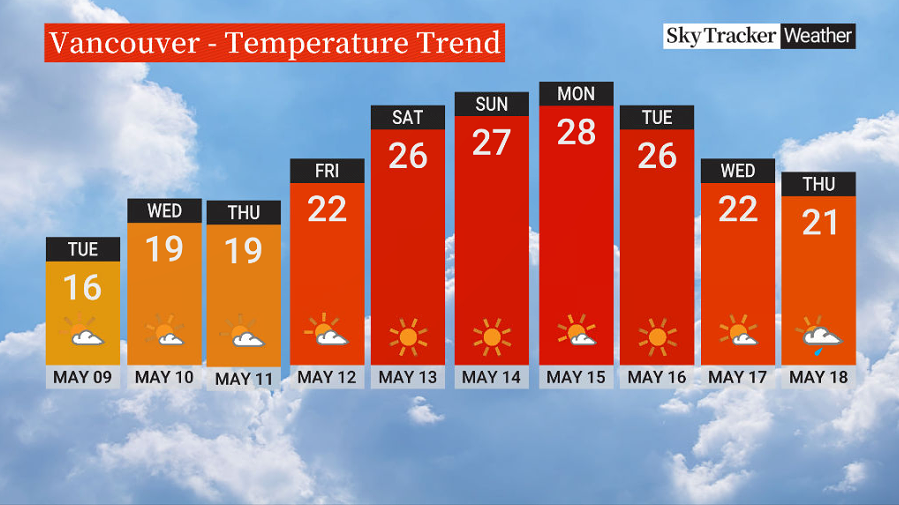Lighter than expected rain over the weekend has provided a “period of stabilization” for B.C. communities under flood threat, but an incoming wave of warm weather is poised to renew both fire and flood risks, officials said Monday.

The immediate threat has begun to recede for B.C.’s hardest-hit communities, including Cache Creek, Grand Forks and the Okanagan Indian Band, according to Emergency Management Minister Bowinn Ma.
“So what we’re anticipating in the week ahead is a period of stabilization for the rivers we have been watching, and then rising temperatures which will likely accelerate snowmelt once more,” Ma said at a multi-agency media briefing.

Across the province, about 50 people remain under evacuation orders due to floods and about 2,000 more remain under evacuation alerts.
Ma said the province sent sandbagging equipment and flood barriers to several communities two weeks ago in preparation, and last weekend, the BC Wildfire Service sent crews to Cache Creek and Grande Forks to help with flood defence.
Meanwhile, more than 55 of 62 active wildfires in B.C. classified as “under control” or being “held.” The majority of active wildfires are in the northeast, which continues to face drought conditions and wind.
According to Forests Minister Bruce Ralston, cooler weather and increased humidity have allowed BC Wildfire crews to make progress on three key “wildfires of note,” including the Teare Lake fire near McBride, which is now being held.
The Red Creek fire near Charlie Lake and Boundary Lake fire on the B.C.-Alberta border, however, remain out of control.

An incident command team, structural protection crews and equipment have also been deployed to Alberta to help the neighbouring province as it grapples with a surge in early season wildfires.
Ma said B.C.’s mobile phone emergency alert was used three times in the Peace Region over the weekend to issue evacuation orders.
Responding to reports of people defying evacuation orders in the area, Cliff Chapman, director of provincial operations for the BC Wildfire Service, urged the public to take the threat seriously.
“If we can learn anything from what’s happening in northern Alberta and central Alberta right now, it’s that these fires are moving extremely quickly with the wind,” he said.
“The conditions in particularly the northeast of B.C. are very challenging from a fire perspective, and when you put 30 to 50 kilometre-per-hour winds on them, they are growing quickly, and they are moving quickly towards, at times, people’s residences, so I strongly, strongly encourage everybody to follow the advice.”
New risks with incoming heat
While the immediate flood and fire situation in B.C. shows signs of stabilizing in the coming days, officials said unseasonably hot weather is expected by next weekend, potentially renewing the risk.
Temperatures of up to 10 C above seasonal averages are forecast, Global BC senior meteorologist Kristi Gordon explained, adding that the warmth could linger five to seven days.
“We know there’s a lot of snow left in the mountains, we’re about a quarter of the way through the provincial seasonal amount, which is very fast,” said Dave Campbell of the B.C. River Forecast Centre.
“So this next period of warming, we’re anticipating an additional round of accelerated snowmelt. We could see again, another period of elevated flood risk in the province, and bringing it on potentially new areas that have not experienced flooding so far this year.”
Chapman said B.C.’s northeast and pockets of the Interior are still dealing with fallout from drought last fall and winter, which sparse precipitation hasn’t been able to remedy.

But he said the next warm spell poses a wider threat, and he urged British Columbians to be extremely careful with any open flame in the days ahead.
“The challenge with the return to above seasonal temperatures is, it won’t only challenge us on the current fires, it’s the threat of new wildfires beings started as well,” Chapman explained.
“What we’ll see over the course of the next five to seven days is … that hazard really trend throughout the province.”
Environment Canada warning preparedness meteorologist Armel Castellan said north and central B.C. could also face dry lightning in the days ahead, potentially adding to the combustive mix.
Ahead of this weekend, Ma urged the public to ensure they have an emergency plan, an emergency kit and a ‘grab and go’ bag prepared in case of an evacuation order or alert. She said British Columbians can also pre-register for emergency support services, which will speed up their ability to get help in the case of an evacuation.





Comments